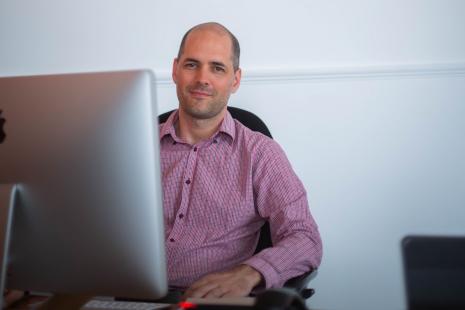Urban Foundry forges great ideas that change the world for the better – improving people’s lives, making better places, and building better businesses. We deliver support and advice to others and we develop our own projects as well. Established in 2004, we’ve worked across the UK on projects large and small.
I didn’t have a sudden ‘eureka’ moment, it evolved from a combination of a love of urban geography in university, which taught me lots about people and place, a fortunate accident of biology that means I’m quite good at recognizing patterns/links between things and thinking creatively, and an almost accidental grounding in the voluntary sector during my time at university that taught me about social entrepreneurialism and the value of networks. But I had always been driven by the idea that I wanted my working life to a) be something I enjoyed doing; b) that made a bit of a difference in the world; and c) to the usual thing of being able to earn enough to feed, clothe and put a roof over the head of an (at that time non-existent) family one day.
I started the business from the spare room in my house – at that time all I really had to start the business was a mobile phone, a laptop, broadband and a car (none of these bought for the business). I didn’t have a penny of start-up capital, I didn’t have lots of money in the bank, and I didn’t have another person that I could rely on to pay the bills whilst I got things going. On the plus side, the nature of my business at that time (and still largely true now) was that people were paying me for my brain – my knowledge and expertise. So, I didn’t need buildings and vehicles and machinery and staff, I just needed me and a means of communicating with people through written and verbal means. So, it meant that, travel and phone bills aside, everything I earned in the early days could come to me and I didn’t need a lot of money to get going.
There are three common questions I get asked whenever I talk about starting your own business: what’s the biggest challenge; why did you/do you do it; and what words of advice would you give to someone starting their own business.
Probably the biggest challenge running a small business is cashflow – maybe more so now than when I started as I have staff who (unlike me in the early days) need to get paid on time each month! I was fortunate to have an existing network of people in my home town, when I was starting my own business, one of whom said that as soon as I went freelance they’d buy some of my time to help them out. That’s how I started.
Being my own boss means that I am in charge of my own destiny. That’s scary sometimes – there are days when I’d love it to be someone else’s problem to pay the bills – but I like to be able to decide on the course of action and what I do. And whilst the hours can often be much longer than in salaried employment, it means that if I want to go home right now to see my family I can. I’ve never had to miss a birthday party for the kids, or a school concert, and more often than not that last minute change of date for that important thing that the kids have
tomorrow is usually something I can manage to make. Plus if the business makes profits – they’re all mine!
My ‘words of wisdom’ for you would be to think about not just what you’re good at but whether you will enjoy doing it. Can you commercialise that talent / idea and earn a living from it? You don’t have to reinvent the wheel – some people will come up with that unique idea that nobody else has ever had, but most of us are a variation on an existing theme. Focus on what you think you can make work and do that thing really well. Learn about marketing and sales – it’s not going to work unless people know about it and want to buy it from you (at the same time be wary of style triumphing over substance!). Keep your chin up – you WILL fail from time to time. Don’t fetishise it – it’s become a bit trendy to celebrate failure like it’s some sort of a goal; you should always seek to succeed. But also don’t think that successful people don’t fail along the way. They do. Lots. Though their successes are public and (usually but not always) their failures are kept private. They’re not always big fails but fail they do from time to time.
Celebrate what you got right but make sure you identify and learn from what you got wrong; but then improve, change, and make sure you don’t make that mistake again.

